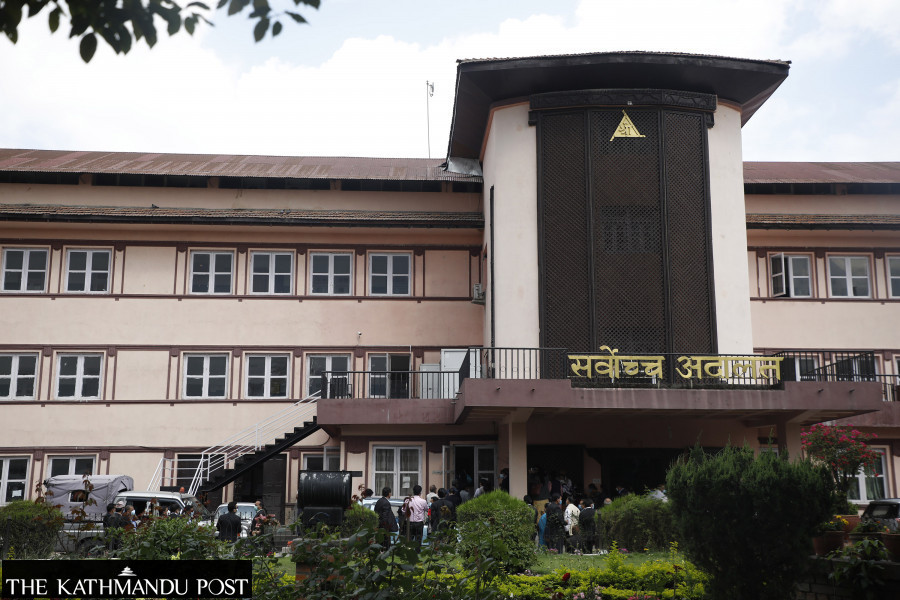Politics
As parties mull repealing ordinance on Political Parties Act, experts say this will raise moral questions
CPN (Unified Socialist) optimistic after Friday’s ruling of the Supreme Court on the ordinance but Janata Samajbadi Party is not convinced.
Binod Ghimire
The refusal of the Supreme Court to issue an interim order on writ petitions, which demand annulment of the ordinance amending the Political Parties Act, 2017, has come as a big relief to the CPN (Unified Socialist).
The party fears its own legality might end if the court quashes the ordinance, based on which it was formed. It has been maintaining that joining the government is not possible until the court decides on the petitions. The party formed after the split in the CPN-UML has interpreted the court’s Friday decision as an indication that the ordinance won’t be scrapped when the final verdict is issued.
“Yes, the refusal to issue an interim order has created a conducive environment to join the government,” Ganga Lal Tuladhar, a deputy general secretary of the CPN (Unified Socialist), told the Post. “We will soon decide about joining the government.”
The government on August 16 prorogued the House of Representatives to issue the ordinance which lowered the bar to split political parties. The ordinance that came into effect on August 18 allows a party’s dissident group commanding just 20 percent support of either the Central Committee or the Parliamentary Party to split the party.
Aided by the ordinance, Madhav Kumar Nepal formed the CPN (Unified Socialist) and Mahantha Thakur formed Loktantrik Samajbadi Party. The ordinance was challenged in the court by seven lawyers individually demanding its annulment. But the court instead of quashing the ordinance has issued a show cause notice to the defendant. Tuladhar said his party has taken the court ruling as a positive development.
While the CPN (Unified Socialist) has said it can join the government now, Upendra Yadav’s Janata Samajbadi Party has been insisting that it will join the government only after the ordinance is nullified. The party fears that some of its lawmakers, in the event of not getting ministerial positions, may split the party further. As per the provisions of the new ordinance, just five lawmakers— 20 percent of 21 lawmakers (including two suspended), can split the Janata Samajbadi Party.
During a meeting of the five-party alliance on Wednesday, they discussed whether to repeal the ordinance or introduce a replacement bill to reinstate the original provisions in the Act. Prior to the amendment of the Act, dissident groups needed to prove 40 percent support in both the Central Committee and Parliamentary Party to split a party.
“The ordinance must be rendered ineffective before the Cabinet expansion. Wednesday’s meeting decided that the prime minister will take necessary decision on the matter,” Upendra Yadav, chairperson of the Janata Samajbadi Party told the Post. The party, according to its leader Rajendra Shrestha, has suggested to the government that repealing the ordinance is the best option.
During the meeting, the CPN (Maoist Centre) and the CPN (Unified Socialist) were for introducing a replacement bill. The Unified Socilist fears the very basis of the formation of the party will be in question if the ordinance is repealed.
Article 114 (2) of the Constitution of Nepal says the President can repeal an ordinance anytime on the recommendation of the government. “The ruling alliance has broadly agreed to introduce a replacement bill,” Krishna Bahadur Mahara, a spokesperson for the CPN (Maoist Centre), told the Post. “That will address the concerns of all the parties.”
Political experts say the opposition and critics of the government will get an opportunity to question the government’s intention if the ordinance is repealed or a replacement bill is brought reviving the Political Parties Act’s old provision requiring 40 percent support to split a party. “The ordinance is being criticised for having a mala fide intention as it was introduced by bypassing the parliament to facilitate the splits in the two parties,” said Shree Krishna Aniruddh Gautam, a political columnist with Kantipur, the Post’s sister paper. “Reviving the original provisions will substantiate the accussion.” He said the parties formed as per the ordinance too will face both moral and legal questions.
Constitution experts say the court didn’t issue the interim order doesn’t mean the final verdict will come along the same line. They say as the court has twice issued a ruling saying ordinance cannot be issued in situations other than requiring urgent action.
On June 10, the court issued an interim order against the implementation of an ordinance introduced by the erstwhile KP Sharma Oli government to amend the Citizenship Act 2006. The court said the ordinance wasn’t of the nature requiring immediate action as prescribed by the constitution. It also said Parliament’s authority is infringed upon when attempts are made to address sensitive issues like citizenship through an ordinance. The court had issued a similar ruling to stop the government’s plan to extract mine-based stones, pebbles and sand.
The Oli government in the national budget, brought through an ordinance, had announced the opening of the extraction of the construction materials and exporting them. On June 18, the Supreme Court said issuing ordinances on issues like natural resources will have a long-term impact.
“If the ordinances issued by the erstwhile government by bypassing the parliament were wrong that applies to the present government as well. However, the decision made so far based on the ordinance will remain valid,” a senior advocate Dinesh Tripathi, who specialises on constitutional law, told the Post. “If the court invalidates the ordinance it will pose a moral question for the government and the parties formed based on the ordinance.”




 13.12°C Kathmandu
13.12°C Kathmandu














